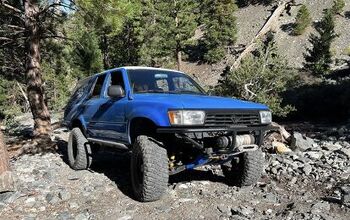Made-In-China Phaeton? Um Himmelswillen!

Wolfsburg’s Über-VW, the Phaeton, will be produced in China. At least if the Chinese car site Auto.163 is correct. The news is coming to you via Chinacartimes, which doubts the article’s veracity, not only because the logic behind Auto.163’s reasoning is a bit backwards. Is it really?
Says Chinacartimes:
“Auto.163 are citing VW’s new DSG gearbox factory in Tianjin as the source for its Chinese Phaeton rumors. The new gearbox factory will produce the DQ380 and DQ500 gearboxes which are only used in the flagship vehicle. Does this mean the Phaeton will be produced in China? Probably not. Does it mean that the gearbox will likely be exported? Probably yes.”
The Phaeton became infamous in the U.S. for being a dud. It was pulled off the U.S. market in 2006, despite the efforts of Jack Baruth to prop up its market share by buying two. That spike in the U.S. Phaeton sales, that was Jack.
The Phaeton currently goes through its second spring. Last year, 11.000 were sold, 50 percent more than in the already surprisingly good 2010. Moving the production of the Phaeton to China would make sense. “Asia is its most important market,” said a Volkswagen spokesman. “70 percent of the vehicles go to the Far East.”
China is the Phaeton’s largest market also because the Phaeton is a great way around some company or government purchasing rules. The buyer can claim with a straight face that “it’s a Volkswagen.”
“The Phaeton is priced from an affordable 758,800 RMB to 2.53 million in the Chinese market,” says Chinacartimes. That’s between $120,000 and $400,000. Should it be produced in China, the price could come down a bit because the 25 percent import tax is avoided. But then, once you are in that stratosphere, a few dollars less don’t really count. Also, Volkswagen could close the Phaeton’s factory in Dresden if most of them are made in Shanghai.

Bertel Schmitt comes back to journalism after taking a 35 year break in advertising and marketing. He ran and owned advertising agencies in Duesseldorf, Germany, and New York City. Volkswagen A.G. was Bertel's most important corporate account. Schmitt's advertising and marketing career touched many corners of the industry with a special focus on automotive products and services. Since 2004, he lives in Japan and China with his wife <a href="http://www.tomokoandbertel.com"> Tomoko </a>. Bertel Schmitt is a founding board member of the <a href="http://www.offshoresuperseries.com"> Offshore Super Series </a>, an American offshore powerboat racing organization. He is co-owner of the racing team Typhoon.
More by Bertel Schmitt
Latest Car Reviews
Read moreLatest Product Reviews
Read moreRecent Comments
- W Conrad I'm not afraid of them, but they aren't needed for everyone or everywhere. Long haul and highway driving sure, but in the city, nope.
- Jalop1991 In a manner similar to PHEV being the correct answer, I declare RPVs to be the correct answer here.We're doing it with certain aircraft; why not with cars on the ground, using hardware and tools like Telsa's "FSD" or GM's "SuperCruise" as the base?Take the local Uber driver out of the car, and put him in a professional centralized environment from where he drives me around. The system and the individual car can have awareness as well as gates, but he's responsible for the driving.Put the tech into my car, and let me buy it as needed. I need someone else to drive me home; hit the button and voila, I've hired a driver for the moment. I don't want to drive 11 hours to my vacation spot; hire the remote pilot for that. When I get there, I have my car and he's still at his normal location, piloting cars for other people.The system would allow for driver rest period, like what's required for truckers, so I might end up with multiple people driving me to the coast. I don't care. And they don't have to be physically with me, therefore they can be way cheaper.Charge taxi-type per-mile rates. For long drives, offer per-trip rates. Offer subscriptions, including miles/hours. Whatever.(And for grins, dress the remote pilots all as Johnnie.)Start this out with big rigs. Take the trucker away from the long haul driving, and let him be there for emergencies and the short haul parts of the trip.And in a manner similar to PHEVs being discredited, I fully expect to be razzed for this brilliant idea (not unlike how Alan Kay wasn't recognized until many many years later for his Dynabook vision).
- B-BodyBuick84 Not afraid of AV's as I highly doubt they will ever be %100 viable for our roads. Stop-and-go downtown city or rush hour highway traffic? I can see that, but otherwise there's simply too many variables. Bad weather conditions, faded road lines or markings, reflective surfaces with glare, etc. There's also the issue of cultural norms. About a decade ago there was actually an online test called 'The Morality Machine' one could do online where you were in control of an AV and choose what action to take when a crash was inevitable. I think something like 2.5 million people across the world participated? For example, do you hit and most likely kill the elderly couple strolling across the crosswalk or crash the vehicle into a cement barrier and almost certainly cause the death of the vehicle occupants? What if it's a parent and child? In N. America 98% of people choose to hit the elderly couple and save themselves while in Asia, the exact opposite happened where 98% choose to hit the parent and child. Why? Cultural differences. Asia puts a lot of emphasis on respecting their elderly while N. America has a culture of 'save/ protect the children'. Are these AV's going to respect that culture? Is a VW Jetta or Buick Envision AV going to have different programming depending on whether it's sold in Canada or Taiwan? how's that going to effect legislation and legal battles when a crash inevitibly does happen? These are the true barriers to mass AV adoption, and in the 10 years since that test came out, there has been zero answers or progress on this matter. So no, I'm not afraid of AV's simply because with the exception of a few specific situations, most avenues are going to prove to be a dead-end for automakers.
- Mike Bradley Autonomous cars were developed in Silicon Valley. For new products there, the standard business plan is to put a barely-functioning product on the market right away and wait for the early-adopter customers to find the flaws. That's exactly what's happened. Detroit's plan is pretty much the opposite, but Detroit isn't developing this product. That's why dealers, for instance, haven't been trained in the cars.
- Dartman https://apnews.com/article/artificial-intelligence-fighter-jets-air-force-6a1100c96a73ca9b7f41cbd6a2753fdaAutonomous/Ai is here now. The question is implementation and acceptance.


































Comments
Join the conversation
Doesn't make sense technically: "The new gearbox factory will produce the DQ380 and DQ500 gearboxes which are only used in the flagship vehicle." So far, the Phaeton uses longitudinally installed engines, and both cited gearboxes are transversally mounted (hence DQ = Doppelkupplung Quer). If the Phaeton successor goes on a Passat basis, those DQs would be fine, but in that case the largest possible engine would be a five-cylinder (or the dying VR6) (which might be sufficient for most Chinese though, but then this car is without V6 Diesels and thus out of Europe and anyplace outside China) (which in fact is the current status).
So the made in China Phaeton will be more or less reliable than the one that was made in Deutschland?